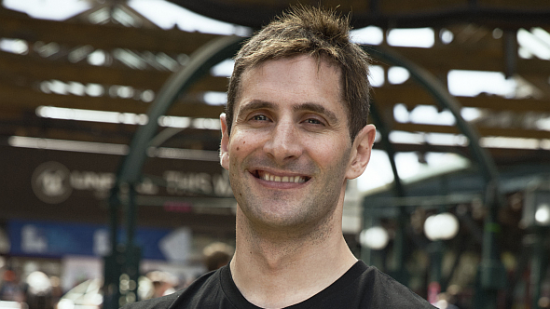If you haven’t heard of Dean ‘Rocket’ Hall by now, let’s get this out of the way: he’s the guy who popularised a genre with the original DayZ mod, then left its standalone version with Bohemia Interactive before it was done (a fact which, perhaps unfairly, continues to overshadow his career).
If you too crave the nasty, brutish and short life, try some of the best survival games on PC.
A survival obsessive who has climbed Everest, Hall’s next game is Stationeers, a multiplayer space station simulator inspired by 2003’s Space Station 13 (which you can play for free at its website). Stationeers is now a month or two away from an early access launch (though Hall insists he won’t be “held fast” to a specific date), and we’ve been speaking with him about the game’s features and development.
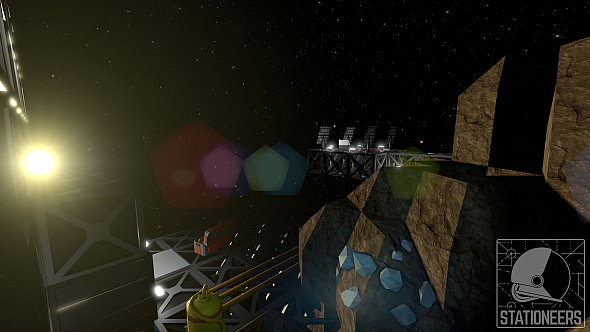 PCGN: Stationeers was playable for the first time at Rezzed last month. How was the response? Were you pleased?
PCGN: Stationeers was playable for the first time at Rezzed last month. How was the response? Were you pleased?
Dean Hall: Yeah, very pleased. Probably better than I expected, really. It’s tough to explain to people what the game is, and Rezzed was a good place to show it. People picked it up better than I was expecting.
I wanted to ask about that, because when we spoke there, you said you’d coached a player to get back to his station by filling his mask with oxygen and using it as an improvised propellant. Have players found such innovative solutions by themselves?
We did have one player who had been playing for a while, and he figured out very quickly to use his waste tank when he’d run out of propellant. So we did start to find that people were figuring that out.
The challenge was that the inventory system – because we didn’t want to take people out of the world – was quite convoluted. We are improving that. It was a bit of a barrier, and it got in the way of people enjoying the experience. That’s why it was such a challenging game to show.
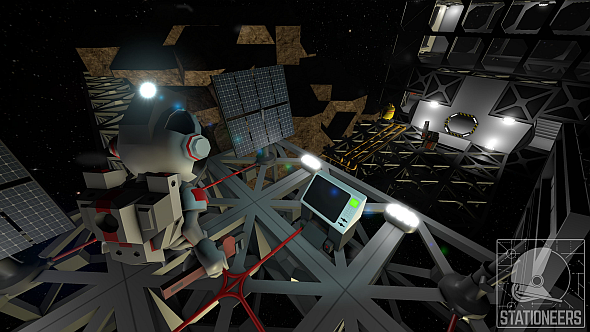
Let’s talk about the away missions. What will they add?
We see them as a key component. The way I’ve been explaining it is ‘think Minecraft realms’. Otherwise, we do struggle a bit with a context.
Like in Minecraft, they’re places you want to go to, and you can have them as something where you re-base yourself completely. That’s largely how we see it going.
When you start the world, you choose the scenario you want to start in. One might start you in an asteroid field, like at Rezzed, and you build your station [there]. Or you might be on a planet and you might have crash-landed, something like that. So the first experience of away missions would be [deciding] where you start, then you can choose to go and find resources, or you can set up a base right away.
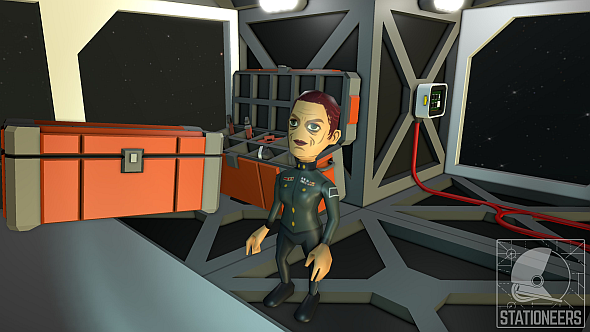
You mentioned that you enjoyed the role-playing in Space Station 13. How will you approach that side of things?
This is one of those things where you get players like me who bring in role-playing even when there’s really no role-playing, and you can try and force things through in your game. You’ve got to be very careful how you force them. We want more organic role-playing to come out of it.
The game is persistent – like Minecraft where you build up your world, it carries on – and your character can grow in skills and attributes. Those will add an element of role-playing because your character will get good at doing certain things, and amongst your friends, it’s likely you’ll develop some degree of specialisation.
We’ve also been looking at how that factors into everyday stuff. The example I used was based on a mod for Minecraft called EnviroMine, which has insanity as a mechanic. So if you spend a lot of time out in space mining, your insanity can go up, and you can develop illnesses that might need to be treated.
The way you get around that is by going to a bar and having a drink, or sitting in a nice room. So it’s a nudge towards giving tangible roles in the game – it’s not forcing role-play, but it’s creating an environment where role-play can happen… [It] gives you an opportunity to interact with another player, like a bartender, or someone cooking food.
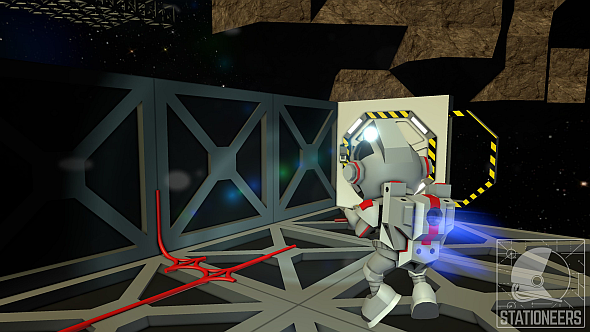
You said the Rezzed build was made by just six staff, with a couple more having joined you since. It sounds like a very deep game for a small team, with many overlapping survival systems. How have you managed it?
I think it comes down to simplicity. Many people will write us off just because of the art style, but that’s one of the key things. Our focus is on what I call ‘mean time to feature,’ how long it takes us, from start to finish, to develop a feature. That became incredibly important to the development of the game.
We started with a base class of a type of object, and that meant we could rapidly create new elements of the game, and everything shares a common architecture. It’s semi-unfair to say that the game had a short development time and a small team, because a lot of the technology that we use – and certainly the architecture that was designed – has been done in games that I’ve tried to make previously. So we’re kind of standing on the shoulders of giants there.
If you look at the inventory, it’s really just a basic slot system, and that system applies to everything. I think that’s been the key [to] getting us to where we are now. It creates other problems, though.
Such as?
Well, it’s complicated, but basically it’s hard to make something have very bespoke behaviours. When we make something new, we’re nearly always trying to leverage something else, and sometimes that means it’s less than perfect. For example, the surgery system is based on the slot system – pulling a tank from a backpack is the same as pulling a heart from your body.
So rather than using a new system for surgery, we’re leveraging the same system across many things. That provides us a lot more stability in multiplayer, but it does restrict the designs.
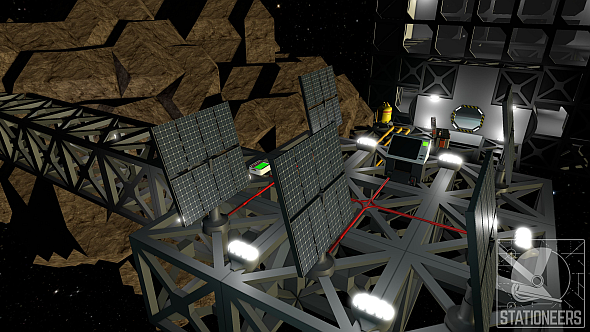
With all the systems you’re including, it’s clear you’re trying to be comprehensive in modelling the survival experience in space. Is there anything you’ve had to leave out?
Oh yeah, heaps, and that’s perhaps been the biggest battle. Because I’ve tried to make this game several times and failed, I really wanted to make sure we didn’t make those mistakes this time. So I’ve been a real stickler for the simplest implementation possible.
There’s been many areas that we’ve been quite ruthless on. We’re ruthless on view distance at the moment – we cull stuff that’s reasonably close by, and that’s a contentious point. We’ve been ruthless on the art style, which is very minimalistic, with very simple polygons, simple colours.
Those were deliberate decisions so we could rapidly get where we wanted to go with the development, but there is a compromise, and I’m sure that will turn some people away from the game.
What kind of features would you like to build in if the demand was proven?
I’ve always been interested in linking worlds together, and one thing I mentioned in myReddit AMA was the ability to trade between stations. That’s definitely achievable – so that’s why I’m not too concerned about saying it – but whether we do it or not would depend on demand for the game, because there’s an ongoing cost to running it.
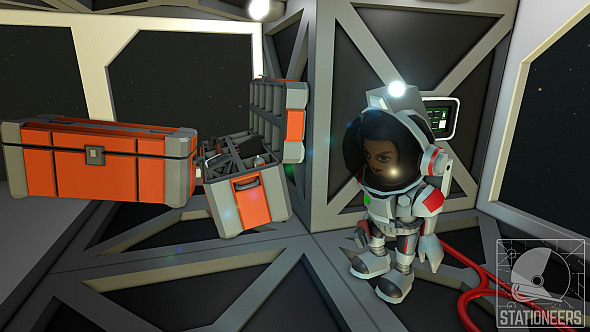
When it comes to implementing things like that, what’s the process you go through to decide whether it’s worth it?
We discuss things a lot, we argue even more, and we consider how it would fit with our core game loops – we outlined what they were at Rezzed. This is a hard thing, it’s something I do every day, and I always think ‘How close are we to completing that loop?’
So one of the next things I’m working on is the full food system. At the moment you can grow plants, but [to complete the loop] we need to take those plants, we need to grind them up, and make them into food. A loop we just finished was, if you’re in a spacesuit and you run too hard into something, your spacesuit will rupture, and you’re going to need to repair it with duct tape. That’s a great mechanic because it gives you a non-urgent thing that you have to manage, and a reason to take your spacesuit off when you’re inside.
The most important thing when we enter early access is that the game loop is complete and fun. I play a lot of early access games, and the ones that are successful, that people enjoy, all have a great core game loop. Case P, Prison Architect, Rimworld – they have fantastic core game loops, and with each update, they just build on it.
That’s why I answered your question before about away missions. That is really key. We can’t go into early access without a bare bones version of that, because it’s integral to the game loop.
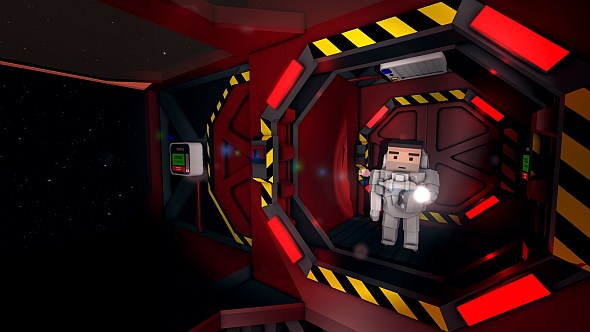
Is it possible that touching on every aspect of survival might overwhelm the player? How do you balance the systems so the player can stay on top of them all, and still engage in the more creative aspects of the game?
That is a very good question. And honestly I don’t know, and I’m not really concerned that we don’t know. We’re really just trying to have fun. This is just the game I’ve always wanted to play, and I don’t know that there’s many other people who do, but that doesn’t bother me and I’ve found that quite liberating.
I think this is where I hoped [Minecraft’s] Notch would get to, because it’s very tempting when you release a big game, and everybody wants – no, everybody expects – that your next game is going to be bigger, and people seem to see it as a failure if [it’s not]. I no longer feel like that at all.
It’s a long-winded way of saying ‘I have no idea’. We aren’t being gratuitous with the systems, we do consider them carefully and look at balance, but I want to see more games that present complex, potentially unsolvable problems for you to try and solve with your friends – that’s what we’re trying to do.
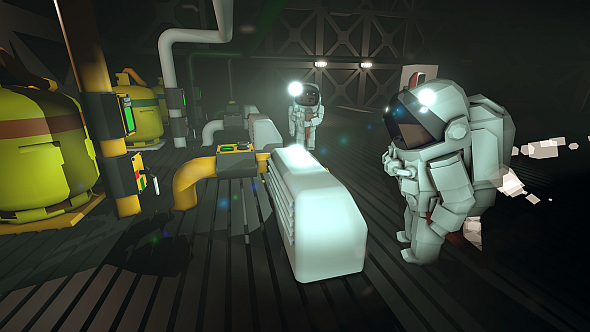
In your Rezzed talk, you discuss computers which you can use to automate systems like atmospheric regulation, and you’ve already got machinery in the game. How much of the survival burden can the player lift with these?
This is an area I’ve been fascinated with for a long time. And one of the great challenges is balancing: how much do you let a machine do? I’ll use Factorio as an example. I love Factorio, but as development’s gone on, there’s less and less need to use the logic systems, even though you can build amazing stuff with them. So we’re trying to strike a balance between providing interesting machines that feel somewhat complete, but still giving you reasons to build logic systems yourself – that’s so much more rewarding.
A good example is our airlock control system. You don’t want to have to place an incredible array of stuff, like logic gates and all that, to build an airlock. So it’s fairly standardised, but you do get some degree of decision-making. How many air pumps do you want to have? How many gas sensors do you want to have? Where are your doors? And you can screw [that] up. You could have all your air coming from one side and your gas sensor in another place, so they’re out of sync and the door opens too early, or too late.
On the more complicated side is manufacturing. You get a lot of room to figure out how you want to run it; you might have a gas turbine where you’re pumping hot air on one side, and it goes through the fan and comes out the other. You might connect that to a computer and tell it to ‘shut off the valve at this time’, and to do that, you have to wire a cut-off valve to the computer, and you have to fill out all the conditions for it, and you also have to wire the computer to a gas sensor.
That gives you an idea of what we’re trying to do. It’s not enough to put logic systems in a game – you’ve got to give a reason to use to logic systems. It’s a very hard thing to get right, to be honest.
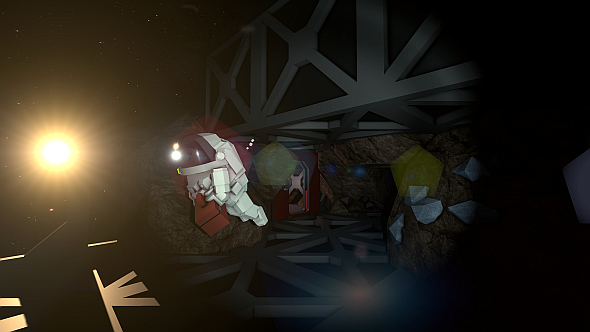
You’ve tried to make this game three times now. Is this one the charm?
We’ll see. The other day we set a record of 28 players playing, with excellent bandwidth usage. It was fantastic. It was the first time we’d run a playtest with a large number of players that had no major errors, so that’s putting us on the road to release.
We’re having a lot of fun making it and a lot of fun playing it. There’s definitely a game there. The question is ‘how good is the game?’ and ‘what is the community that wants to play that game?’ I really don’t know, and I kind of don’t mind, and I kind of like that.
Stationeers’ Early Access page ishere. It’s expected to be available for purchase within the next two months, approximately.
